Madlener House
4 West Burton Place
Chicago, Illinois 60610
Telephone: 312.787.4071
info@grahamfoundation.org
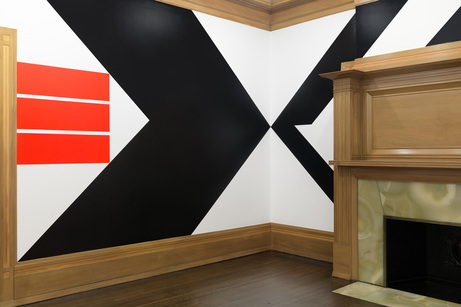
Join us for the final monthly extended gallery and bookshop hours (5–8 p.m.) for our current exhibition, Exits Exist by Barbara Stauffacher Solomon on the last Thursday of the month. A walkthrough of the exhibition led by Graham Foundation staff will begin at 6:30 p.m.
All purchases in the bookshop during evening hours will be 15% off.
Exits Exist, an exhibition by San Francisco-based Barbara Stauffacher Solomon, presents site-specific supergraphics for the Graham Foundation’s Madlener House galleries along with works on paper, artist's books, and a new series of sculptures.
To learn more about the Graham Foundation Bookshop, click here
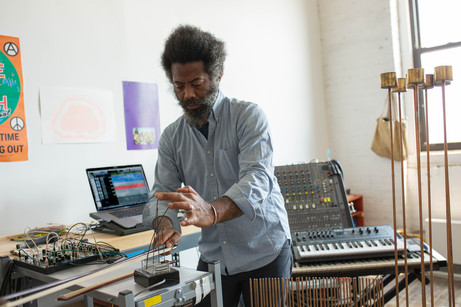
Robert Aiki Aubrey Lowe (b.1975, Kansas City, Mo.) premieres Three-Sided Figure, his new modular synth and voice performance. Lowe is an artist and composer working primarily with voice and modular synthesizers in the realm of spontaneous music. Speaking about his work, he reflects that “the marriage of synthesis and voice has allowed for a heightened physicality in the way of ecstatic music.” The sensitivity of analogue modular systems echoes the organic nature of vocal expression, which in this case is meant to put forth a trancelike state, to usher in a deeper listening through sound and feeling.
Collaborators include Ben Russell, Ben Rivers, Rose Lazar, Hisham Akira Bharoocha, Ben Vida, Lucky Dragons, Alan Licht, Patrick Smith, Monica Baptista, Lee Ranaldo, Kevin Martin, Chris Johanson, Tyondai Braxton, David Scott Stone, Genesis P-Orridge and Rose Kallal, as well as many others. Select appearances include Doug Aitken’s Migration happening at 303 Gallery (2008) and Princeton University (2010), La Suite for Serpentine Gallery (2012), In the Wan Light of Napalm and Moon with Evan Calder Williams (2012), Peradam with Sabrina Ratté at EMPAC (2014), Cinéma du Réel at the Centre Georges Pompidou (2014), performances with Ariel Kalma at Lincoln Center (2015), Unsound Festival and San Francisco Electronic Music Festival (2018), and Tarek Atoui’s Organ Within at Kurimanzutto and the Guggenheim Museum (2019). In November 2014, Lowe premiered Early Hypnagog in the Lampo series. Recent projects include composing the Candyman score (2021), which was on the shortlist to receive an Oscar nomination for Best Original Score, and sound for Rashaad Newsome’s Assembly at the Park Avenue Armory (2022). He lives in Brooklyn, New York.
Since 2010 the Graham Foundation has partnered with Lampo to produce an international performance series held at the Madlener House. Lampo, founded in 1997, is a nonprofit organization for experimental music and intermedia projects.
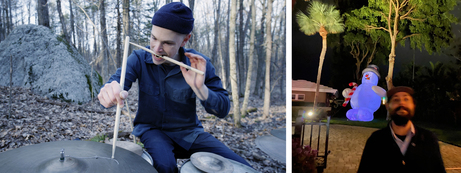
Returning to the Graham Foundation with a limited in-person concert, Lampo presents Intraday by Andrew Lampert and Chris Corsano. This reactivation of the Lampo performance series at the Graham also launches the Lampo Folio, a collection of ten text-based scores created during the pandemic.
Intraday is a musical study of Spotify’s stock fluctuation between 12 p.m. and 1 p.m. on May 13, 2021. The work is a structured improvisation performed in accordance with the ups and downs of the stock price, as represented by 92 line charts in the score. Performers are presented with a wide range of tactics to guide them through a small amount of musical space.
The Lampo Folio, co-edited by Andrew Fenchel and Andrew Lampert, is a collection of text-based scores from ten interdisciplinary artists engaged with sound and language, including Nikita Gale, Sarah Hennies, Bonnie Jones, Andrew Lampert, Jessie Marino, Nour Mobarak, Gala Porras-Kim, Elliot Reed, Sergei Tcherepnin, and Jennifer Walshe. Each commissioned work is published in the form of instructions that can be used to enact an intimate performance in a personal space such as one’s home. The premiere of Intraday coincides with the hour the score was composed and is intentionally presented in the domestic context of the Graham Foundation’s Madlener House, which was a home from 1902–1963.
Since 2010 the Graham Foundation has partnered with Lampo to produce an international performance series held at the Madlener House. Lampo, founded in 1997, is a nonprofit organization for experimental music and intermedia projects.
Note that seating for this performance is very limited. Reservations are required for entry. If you make a reservation and then are no longer able to attend, please cancel your reservation through Eventbrite or email info@grahamfoundation.org to release the spot to someone on the waiting list. Masks are required for all, regardless of vaccination status.
Andrew Lampert (b. 1976, St. Louis) is an artist, archivist, and writer. His eclectic and extensive body of films, videos, performances, and photographs have been exhibited at the Whitney Museum of American Art, J. Paul Getty Museum, Solomon R. Guggenheim Museum, Art Gallery of Ontario, International Film Festival Rotterdam, Toronto Film Festival, and New York Film Festival, among other venues. The former Curator of Collections at Anthology Film Archives, he has preserved hundreds of important films and videos. Recent projects include co-editing and contributing to the text score collection Lampo Folio (2021, Lampo); releasing the album Lush Valley (2021); co-editing the book Tony Conrad: Writings (2019, Primary Information); and co-writing (with Howie Chen) the monthly column “Hard Truths” for Art In America. His new book, William Wegman: Writing by Artist, will be released by Primary Information this spring.
Chris Corsano (b.1975, Englewood, New Jersey) is a drummer who has worked at the intersections of free jazz, avant-rock, and experimental music since the late 1990s. He is a rim-batterer of choice for some of the greatest contemporary purveyors of jazz (Joe McPhee, Paul Flaherty, Evan Parker, Mette Rasmussen) and rock (Sir Richard Bishop, Bill Orcutt, Jim O’Rourke), as well as artists beyond categorization (Björk for her Volta album and world tour, Ghédalia Tazartès, Michael Flower, Okkyung Lee). Appearing on over 150 albums and touring in a wide array of collaborations, Corsano is also a celebrated solo performer, weaving free improvisation, extended percussion techniques, reed instruments, and drum heads resonated by bowed strings into an “ensemble of one.” In 2017, he received the Foundation for Contemporary Arts Grants to Artists Award.
Lampo, established in 1997, supports artists working in new music, experimental sound and other interdisciplinary practices. The Chicago-based organization's core activity has been and remains its performance series. Rather than making programming decisions around tour schedules, Lampo invites selected artists to create and perform new work, and then the organization provides the space, resources and curatorial support to help them fulfill their vision. Lampo also organizes artist talks, lectures, screenings and workshops, and publishes written and recorded documents related to its series.
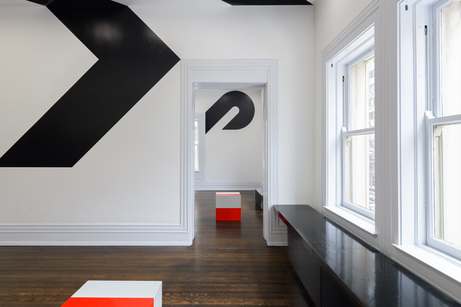
Join us for an introduction to Exits Exist, an exhibition by San Francisco-based Barbara Stauffacher Solomon, including site-specific supergraphics for the Graham Foundation’s Madlener House galleries along with works on paper, artist's books, and a new series of sculptures. Tours are led by Graham Foundation staff and invited guests.
Friday, 12-1 p.m.
July 1 and July 8
REGISTER HERE
Saturday, 2–2:30 p.m.
July 9
REGISTER HERE
Last Thursday of the month, 6:30–7 p.m.
June 30
REGISTER HERE
Group tours are available by request, contact us at info@grahamfoundation.org
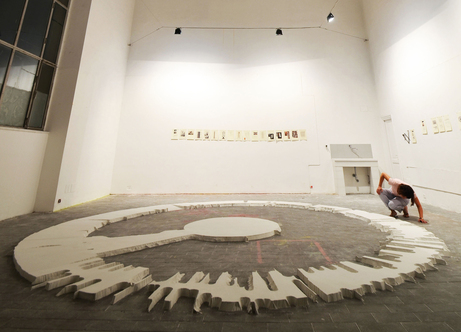
As the once distant concerns of extraction and scarcity become more immediate, a direct engagement with the unruly behavior and associative potential of base materials can offer architects a training ground for addressing these same issues at larger scales. Joshua G. Stein will present his research on casting techniques and the recuperation of traditional craft into architectural digital fabrication: “Casting Lessons” examines how material technique might offer methods for grounding the often disembodied discussions around digital form making, historical style, and urban datasacapes.
Joshua G. Stein is the founder of Radical Craft and the codirector of the Data Clay Network (www.data-clay.org), a forum for the exploration of digital techniques applied to ceramic materials. Radical Craft (www.radical-craft.com) is a Los Angeles-based studio that advances an experimental art and design practice saturated in history, archaeology, and craft. Stein is author of Trajan’s Hollow (ORO Editions, 2019), which examines the role of craft and reproduction in the era of digital scanning and fabrication. He is Professor of Architecture at Woodbury University where he also directs the Institute of Material Ecologies (T-IME). He is the 2019–20 Mitchell Visiting Professor of Architecture at the School of the Art Institute of Chicago.
Image: Installation view of "Trajan’s Hollow," American Academy in Rome, 2011. Courtesy the artist. Photo: Michael J. Waters
For more information on the exhibition, Poured Architecture: Sergio Prego on Miguel Fisac , click here.
Unless otherwise noted,
all events take place at:
Madlener House4 West Burton Place, Chicago
GALLERY AND BOOKSHOP HOURS
2025 Chicago Architecture Biennial
SHIFT: Architecture in Times of Radical Change
Sep 19, 2025–Feb 28, 2026
Wed–Sat, 12–5 p.m.
CONTACT
312.787.4071
info@grahamfoundation.org
Accessibility
Events are held in the ballroom on the third floor which is only accessible by stairs.The first floor of the Madlener House is accessible via an outdoor lift. Please call 312.787.4071 to make arrangements.
Copyright © 2008–2026 Graham Foundation. All rights reserved.
 PREVIOUS POSTS
PREVIOUS POSTS